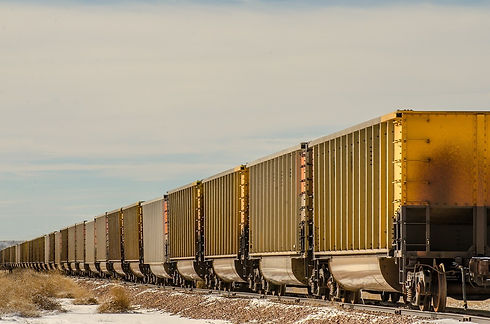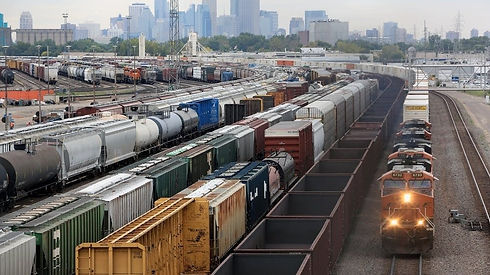
North America Freight Car
Association
protecting the interests of the private railcar industry for more than 30 years
Current Issues

Car Hire Reform
Car hire is the system by which a railroad compensates another railroad for a railcar on its line bearing the mark of the second railroad. It is an hourly and mileage-based system governing the use of certain types of freight cars whether loaded or empty. The rate was formerly prescribed by the Interstate Commerce Commission according to age and cost-based formulas and was de-prescribed by the ICC in 1993 (ex parte 334). The rate methodology is now governed by the Association of American Railroad's Circular OT-10, the Code of Car Hire Rules.
Pursuant to OT-10, the compensation rate for each car type is negotiated between the railcar owner and each railroad over which the car may operate. When a car operates over a railroad for which no bilateral agreement exists, highly unlikely considering that there are over 700 railroads in the United States, the Code of Car Hire requires the car owner to be compensated at the lowest negotiated rate in effect for that car type in the quarter before the car was built or first registered. The default rate sticks with the car when it is operating on any railroad for which there is a bilateral rate agreement.
The flaw in this methodology is that it favors railroads over car owners as in the absence of a negotiated rate, the applicable default rate is artificially low, stays with the car for its entire live unless a negotiated rate is reached, is not responsive to changing market conditions, and is non-compensatory.
Thousands of boxcars have been assigned default rates which are a fraction of a remunerative rate. Under the default rate system, car owners have virtually no recourse as two railroads can agree on an ultra-low rate which will be applicable to all cars of the same type for which a negotiated rate has not been set.
NAFCA has joined with other rail car owners, operators including the American Forest and Paper Association, Distillers Spirits Council of the United States, and National Industrial Transportation League in support of a petition, filed by the Railway Supply Institute, requesting that the Surface Transportation Board reopen ex parte 334 to pursue changes to the default rate.
Petition to Adopt Rules Governing Private Railcar Use by Railroads
In 2021, NAFCA led a coalition of organizations whose members own or use private railcars in petitioning the STB to adopt rules to incentivize the Class I railroads to utilize private railcars more efficiently. The petition (STB No. EP 768) seeks adoption of regulations enabling private railcar providers to assess a “private railcar delay charge” if a railroad exceeds an “allowable transit idle time,” of seventy-two (72) consecutive hours at any point on a railroad’s system while the private loaded or empty railcar is being transported under a bill of lading or similar documentation between the time the private railcar is released for transportation to when it is either constructively placed or actually placed at the private railcar provider’s facility or designated location.
The STB has accepted the petition for rulemaking and issued a request for public comments on several questions involving private railcar use and the components of the proposal The opening comment period concluded June 30, 2022, with reply comments filed by September 8, 2022. The next step is for the STB to issue a notice of proposed rulemaking that leads to final rules adopting the NAFCA proposal or some other appropriate mechanism to incentivize more efficient private railcar use. While we still await final STB action, the prompt consideration of the petition for rulemaking suggests that the Board will resolve this issue in the near future.


NAFCA et al vs. Union Pacific RR Company (Docket NOR 42144)
In 2015 the Union Pacific Railroad adopted a tariff item which shifted the cost of transporting empty tank cars to and from repair facilities from UP to private tank cars providers. NAFCA promptly led several trade associations and individual tank car providers in challenging this tariff item and filed a complaint with the Surface Transportation Board (STB) alleging that UP was not compensating tank car providers through what it labelled “zero mileage” rates, and that the charge it was assessing for movements of empty tank cars to repair shops violated clear case precedent and applicable statutes.
NAFCA’s complaint was followed by identical complaints filed by other individual tank car providers that were all consolidated into one STB proceeding.
After almost ten years the STB finally issued a decision on January 15, 2025, which granted some relief to NAFCA and the other complainants. The Board found that the complainants did not submit evidence sufficient to overcome a presumption that UP’s zero mileage rates compensate tank car providers, and so the Board did not award damages to the individual complainants. The Board also determined that UP relied on past precedent in assessing the charges for empty repair movements, and that the zero mileage rates adequately reimbursed tank car providers for such charges. However, the Board determined that going forward, the burden was on UP (and other carriers) to demonstrate compensation. It therefore prohibited UP, effective 30 days from the date of the decision, from charging for empty repair moves going forward unless it can demonstrate that car providers are reimbursed for these costs.
NAFCA and the other parties are considering the options available for asking the Board to reconsider the negative parts of the decision and/or appealing the decision to a U.S. Court of Appeals. On January 22, 2025 UP filed a Petition for Review of the decision in the 8th Circuit Court of Appeals. NAFCA and the other parties have until March 17, 2025, to decide whether to file a petition in that court.
Past Issues and Successes
OT-57
NAFCA led the industry in remedying the railroads’ decades long abusive utilization of OT-5 to drag out, if not flat out, deny OT-5 applications. We are very proud of our industry leadership in working with the AAR to resolve the numerous OT-5 issues and to develop a new and improved system including replacement of the OT-5 application with OT-57 which has proven to be effective in eliminating the burdensome OT-5 system that was in place for so many years. Our success in establishing OT-57 has eliminated the need for shippers to obtain carriers’ approval for the use of their private cars on their lines and has proven beneficial to the entire private railcar industry.


AAR "Truck Hunting" Standards Litigation
In 2012 NAFCA filed a formal complaint with the STB against the Association of American Railroads (AAR) over the publication of tighter tolerances for "truck hunting" by rail car wheels. The basis for the complaint was that the AAR sought to implement tighter standards with no regard to balancing the cost of compliance against the benefits received, and with no regard for sharing the costs and benefits between railroads and the entities who supplied them railcars.
NAFCA negotiated with the AAR and reached a settlement with the AAR agreeing to publish new industry rules and regulations regarding cost benefit analysis and cost sharing on implementation of new rules.
Under the new AAR Rules, private car owners will no longer be subject to AAR implementation of new rules and regulations without regard to sharing of cost vs benefits received which will result in significant cost savings for private car owners in coming years.
Two Wear and Class D Wheels
In 2014 NAFCA became concerned that certain rail carriers were requiring the installation of new two wear wheels on private cars while saving the less costly turned wheels for use on their own equipment. After reviewing appropriate data NAFCA developed the following position:
(1) NAFCA supports application of two wear wheels on private cars contingent upon:
(a) an industry-wide requirement for equitable use of new vs turned wheels,
(b) objective and measurable standards being developed and codified, and
(c) a penalty being established for not meeting standards
(2) NAFCA does not support application of Class D wheels
(3) The AAR should continue to monitor and assess the application of two wear wheels.


"Pickle" Depreciation
NAFCA has been advocating, as part of Federal tax reform, the repeal of the so-called "Pickle" depreciation rules on U.S.-owned railroad equipment used predominately outside the U.S. or leased to non-US taxpayers. This property is subject to straight-line depreciation over 15 years instead of the more valuable "MACRS" accelerated depreciation (200% DB over 7 year).
The Pickle depreciation rules were designed to prevent the export of U.S. tax savings. However, with the adoption of the U.S.- Mexico - Canada Agreement (USMCA) the resultant free flow of commerce between the U.S., Canada, and Mexico, has rendered the rules' applicability to transportation assets an outdated and costly burden on rail car lessors.
UP "Dirty" Car Litigation
in 2010, NAFCA filed a formal complaint with the STB against the UP alleging that provisions of Item 200-A of UP's Freight Tariff 6004 Series constituted unreasonable practices and violations of UP's common carrier obligation. Pursuant to this item, UP proposed to charge for releasing cars from a shipper's facility that were "dirty" and placed liability on the shipper for cars that were determined by UP to be "dirty" enroute.
The STB issued a decision agreeing with NAFCA that the portion of the UP tariff which assessed a surcharge for lading residue found after a car has left the customer's facility and begun moving in-line haul service was unreasonable. However, the STB found other portions of the UP tariff, which assessed a surcharge for a shipper's failure to remove lading residue from railcars, were not unreasonable.
The STB also found that (1) payment of a surcharge by a shipper does not absolve the shipper of liability that would otherwise apply in the event of a loss; and (2) acceptance by UP of a car with lading residue does not constitute a waiver by UP of any defense it may have in a later civil lawsuit.
